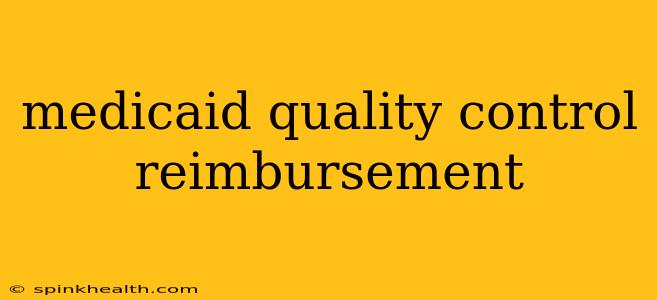Navigating the Maze: Medicaid Quality Control and Reimbursement
The world of Medicaid reimbursement is complex, a labyrinthine system with numerous regulations and requirements. At its heart lies the crucial concept of Medicaid Quality Control (QC), a process designed to ensure that the money spent is used effectively and accurately, ultimately benefiting the recipients of care. Understanding Medicaid QC and its impact on reimbursement is vital for healthcare providers, administrators, and anyone involved in the Medicaid system. Let's unravel this intricate system together.
Imagine a vast network, constantly in motion. That's Medicaid, distributing billions of dollars annually to provide healthcare services to millions. To maintain the integrity of this network, stringent quality control measures are implemented. These measures involve rigorous audits, data analysis, and ongoing monitoring to detect and correct errors in claims processing and provider payments. Think of it as a sophisticated system of checks and balances, ensuring accountability and transparency.
What is Medicaid Quality Control (QC)?
Medicaid QC is a state-administered program overseen by the Centers for Medicare & Medicaid Services (CMS). Its primary goal is to ensure the accuracy and efficiency of Medicaid claims processing. This involves verifying that:
- Eligibility: The individuals receiving services are actually eligible for Medicaid benefits.
- Services Provided: The services billed were actually provided and were medically necessary.
- Billing Accuracy: The claims submitted accurately reflect the services rendered and the appropriate billing codes were used.
- Payments: The payments made to providers are correct based on the state's fee schedules and established guidelines.
These processes are vital in preventing fraud, waste, and abuse within the system. Failure to comply with Medicaid QC guidelines can lead to significant financial penalties for providers, including recoupment of payments and even exclusion from the program.
How Does Medicaid QC Affect Reimbursement?
The impact of Medicaid QC on reimbursement is substantial. Discrepancies identified during QC reviews can lead to:
- Claim Denials: Incorrect or incomplete claims are frequently denied, delaying or preventing payment to providers.
- Payment Adjustments: Even if claims are initially paid, subsequent QC reviews might reveal errors, leading to adjustments or recoupments.
- Audits: Providers may undergo extensive audits, requiring them to provide substantial documentation to support their billing practices. These audits can be time-consuming and costly.
- Penalties: Repeated or significant errors can result in significant financial penalties and even exclusion from the Medicaid program.
This means that maintaining meticulous records, accurate billing practices, and a thorough understanding of Medicaid guidelines are not just good practice, but crucial for financial stability and long-term participation in the program.
What are the Different Types of Medicaid QC Audits?
Medicaid QC audits come in various forms, each with its specific focus and methodology:
- Pre-payment Reviews: These audits examine claims before payment is released to identify potential errors early on.
- Post-payment Reviews: These reviews focus on claims that have already been paid, often targeting specific providers or service types.
- Provider-Specific Audits: These audits concentrate on the billing practices of individual providers, often triggered by patterns of errors or suspected fraud.
- Targeted Audits: These audits focus on particular service areas or types of claims to identify and address systemic issues.
Each audit type employs distinct methodologies, ranging from sample reviews to comprehensive examinations of a provider's entire billing history.
What are the common causes of Medicaid reimbursement errors?
Several factors contribute to errors in Medicaid reimbursement:
- Incorrect Coding: Using the wrong codes for services provided is a frequent source of error. Accurate coding requires a deep understanding of Medicaid's coding guidelines and the specific services offered.
- Incomplete Documentation: Lack of proper documentation to support the services billed can lead to claim denials. Meticulous record-keeping is paramount.
- Lack of Provider Training: Providers who aren't adequately trained on Medicaid billing procedures are more susceptible to making mistakes.
- Systemic Issues: Sometimes, errors stem from problems within the Medicaid claims processing system itself.
By proactively addressing these issues, providers can significantly reduce their risk of reimbursement errors.
How can providers minimize Medicaid reimbursement errors?
Proactive measures can greatly reduce the chances of errors:
- Invest in robust billing software: Technology can help streamline billing and reduce the risk of human error.
- Regularly train staff: Keep your team updated on Medicaid billing regulations and coding guidelines.
- Implement strong internal controls: Establish clear procedures for claim processing, review, and submission.
- Maintain detailed records: Accurate and complete documentation is crucial in justifying claims.
Successfully navigating the Medicaid reimbursement system requires diligence, attention to detail, and a commitment to compliance. By understanding Medicaid QC and implementing robust systems to minimize errors, providers can protect their financial well-being and contribute to the overall efficiency of the Medicaid program. The system is complex, but with careful planning and execution, success is attainable.

